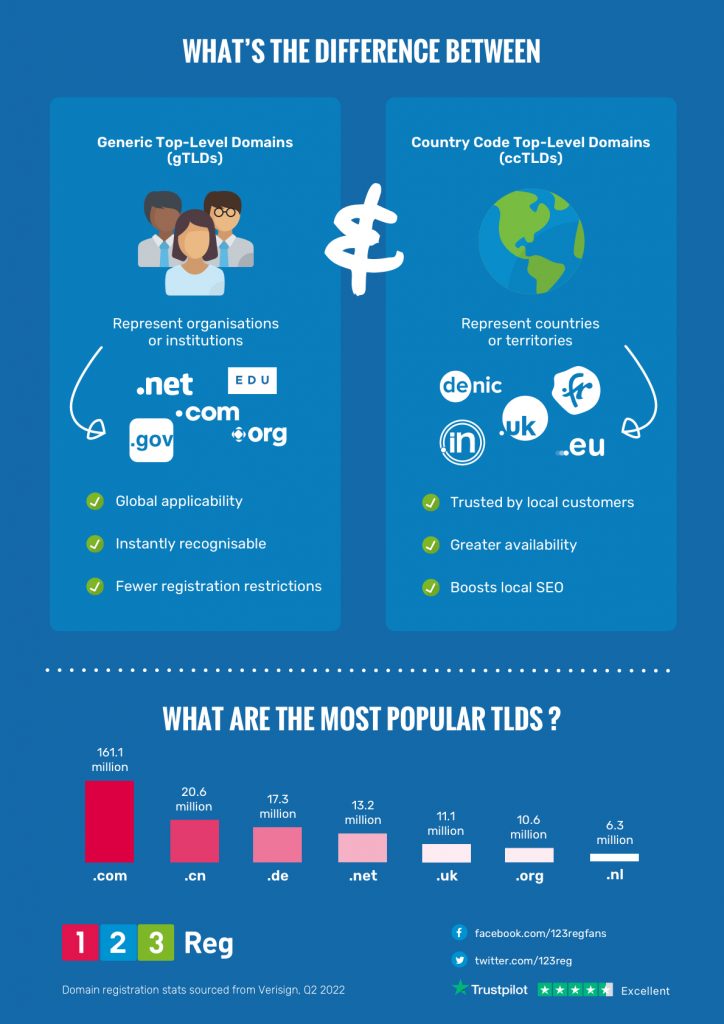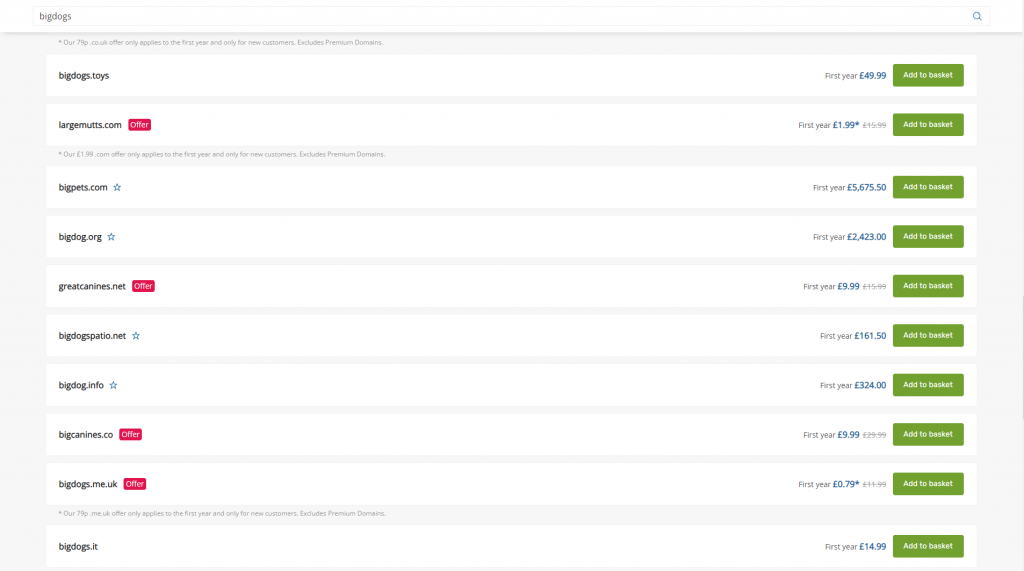How to Choose the Perfect Domain Name – 13 Expert Tips
It’s a pretty big deal, choosing a new domain name. If your website is successful, that name you’ve selected might be with you for years — perhaps even decades. Choosing the wrong name could hurt your chances of success before you’ve even got started.
With many of the best domain names already taken, you may not be able to grab your dream domain name. This guide will help you choose a domain name that works for you. By the end of it, you should have a good idea of how to find a name that aligns with your vision.
13 Useful tips for choosing the perfect domain name
- Domains should be short and easy to spell
- Avoid using hyphens or numbers in your domain
- Pick a domain name that’s brandable
- Consider using keywords in your domain
- Consider including a location in your domain name
- Choose a suitable extension for your domain name
- Avoid using other people’s intellectual property in your domain name
- Use a domain generator for inspiration
- Check the availability of the domain you want to buy
- Register your domain as soon as possible
- Consider using domain protection
- Research social media handles for consistency
- Protect your brand with multiple domains
1. Domains should be short and easy to spell
A short domain name is easier to remember and easier to type. If your domain is more than about 12 characters (including the extension) then the chances are fewer people will remember where to find your website after their first visit.
Avoid using alternative or unusual spellings in your domain name, as this can confuse people. For example, a baking blogger might consider “thebreadryeter.com” as a domain, but it wouldn’t be a good choice since people who hear it spoken aloud could easily end up visiting “thebreadwriter.com.”
If a domain name you’re thinking of buying could easily be mistaken as being something else, you should probably choose another one.
2. Avoid using hyphens or numbers in your domain
Okay, yes. 123-reg.co.uk breaks both those rules, but… While some domains break this rule, in general, numbers can cause confusion (is it example8.com or exampleeight.com?), and hyphens are an extra thing for people to remember. If someone types your domain without a hyphen, they could get an error message or end up on a completely different website.
3. Pick a domain name that’s brandable
In the past, the focus was usually on including keywords in a domain name. However, these days, you’ll want to consider a domain name that’s brandable.
What counts as brandable? For example, think of something like Amazon.com. Once just a river in South America, it’s now a huge e-commerce business thanks to its branding. If you’re unsure about how to get started with branding, this guide offers a good jumping-off point.
4. Consider using keywords in your domain
Keyword-focused domain names aren’t as popular as they once were and you shouldn’t think that just because you’ve got a keyword in your domain you’re going to top Google’s search rankings.
However, a keyword in a domain can still be useful, particularly if it helps people understand what it is you do. For example, if you’re a plumber having a domain with “plumbing” or “plumber” in it could be a good idea.
5. Consider including a location in your domain name
Including a location in your domain name helps people understand where your business is based. It can be beneficial to combine this with a keyword. For example, gosforthplumber.com might be a good domain for a plumber based in an area called Gosforth.
Don’t forget, you can also indicate the location of your business by choosing an appropriate domain extension.
The below graphic shows some of the differences between domain extensions.

6. Choose a suitable extension for your domain name
What’s a domain extension? It’s the .com in example.com, the .co.uk in example.co.uk, and the .london in example .london.
There are loads of domain extensions to choose from. Some are general, like .com, some are business-oriented like, .ltd and .biz domain extensions, some are location-specific, like .co.uk or .in, and some are industry-specific, like .coffee or .ai. Alternatively, some location-specific options can offer a general name that any self starter or business can benefit from, like .co domain extensions.
As .com has been around so long and is so popular, you might struggle to find your ideal domain on a .com extension. Because of that, you may need to be flexible about your domain or your extension, or even both.
7. Avoid using other people’s intellectual property in your domain name
If your perfect domain name includes someone else’s trademark, you could face legal issues. You may have to rebrand your website after launch, which can be costly and time-consuming. It makes sense to check that you won’t be infringing anyone else’s intellectual property before you buy. You can search a global brand database and a UK trademark database.
Note: Intellectual property laws are complex, and just because a word or phrase appears (or doesn’t appear) in one of these databases doesn’t mean you can (or can’t) use it in a domain. If you have any doubts, seek professional advice.
See also: Domain Names and Trademarks: A Guide for Your Online Brand
8. Use a domain generator for inspiration
Finding the right domain name can be tough, so use a domain generator to help get you inspired. A good domain generator should provide you with suggestions based on varying extensions and synonyms.
For example, if you search for a domain name with 123 Reg you get a whole host of alternative examples. In the below example, we’ve searched for bigdogs.com (which is taken) and the screenshot shows just some of the alternatives suggested.

Note: Don’t forget, the rules about intellectual property still apply!
9. Check the availability of the domain you want to buy
Once you know what domain name you want to buy, search for it using a domain name registrar like 123 Reg and see if it’s available. If it isn’t, you’ll need to try something else. (Or see if the domain name is available to buy in the aftermarket.) For this reason, it’s probably a good idea to draw up a list of potential domains before you start searching.
10. Register your domain as soon as possible
Once you’ve found a domain name you like and is available, register it as soon as you can. If you delay, you run the risk of losing your domain to someone else. If it’s available, you can buy your domain name with 123 Reg now.
11. Consider using domain protection
A domain name can be a valuable business asset and domain name protection service can help make sure your it stays safe. Our Full Domain Protection service prevents hackers from stealing your domain or making any other unsanctioned changes and ensures you approve all vital changes to your domain – such as deletion or transfer – through two-factor authentication. Our Ultimate Domain Protection, meanwhile, features everything you get with the Full Domain Protection service, but also lets you hold on to your domain name for an extra 90 days in the event that your credit card or billing method expires. You can add both of these protection services to your cart when you buy a domain.
Without domain privacy, your private and sensitive information (which may include your name, home address, and contact numbers) may be collected and displayed in ICANN’s WHOIS database when you register your domain. Domain privacy ensures that these details are hidden from public view. Our Domain Privacy + Protection package will make ICANN display our contact information instead of yours.
This video will help you pick a strong domain name.
12. Research social media handles for consistency
When establishing an online business presence, your domain name isn’t the only thing that matters. In the digital age, social media is crucial too. It’s important to consider social media when choosing your domain. Ideally, you’ll want social media handles that are the same as your domain (or at least very similar). So, while you’re checking domain name availability, make sure to check social media sites to see if matching handles are available as well.
13. Protect your brand with multiple domains
Let’s say you snag the perfect .com address. You’re done, right? Well, not necessarily! You may still want to consider purchasing other TLD variations and having them redirect to your site. You can even go a step further and purchase common misspellings of your domain name and redirect those, too. That way, you never miss out on traffic due to “user error.” If you decide to register multiple TLDs, you can always check how many similar domains with various extensions (TLDs) have been registered worldwide by using available tools. This strategy can also be applied to social media. Even if you don’t think you’ll use a platform, if the handle matching your domain is available, grab it. It might be good to have in the future, and by registering it yourself, you prevent anyone else from taking it.
See also: Names That Click — How to Choose the Right Domain Name
Conclusion
Choosing a good domain name takes planning and the willingness to compromise. Remember, the domain you choose doesn’t have to be perfect; it just needs to be suitable for your needs.
You can search for and register a domain here, and then explore our UK web hosting plans. Once you’ve picked a domain name, take a look at this guide to help you get your business online.

